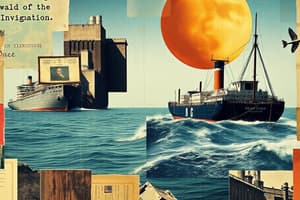Podcast
Questions and Answers
What are some benefits of autonomous vessels in the maritime industry?
What are some benefits of autonomous vessels in the maritime industry?
Increased efficiency, reduced crew requirements, and improved safety
What is the significance of marine technology in the maritime industry?
What is the significance of marine technology in the maritime industry?
Improving safety, efficiency, and environmental sustainability in ocean-based operations
What are some examples of navigation systems used by autonomous vessels?
What are some examples of navigation systems used by autonomous vessels?
GPS, satellite-based systems, and advanced sensors
How do autonomous vessels contribute to reducing the overall cost of operation?
How do autonomous vessels contribute to reducing the overall cost of operation?
What are some advantages of using advanced sensors in autonomous vessels?
What are some advantages of using advanced sensors in autonomous vessels?
What are some applications of big data and analytics in marine navigation?
What are some applications of big data and analytics in marine navigation?
How do IoT devices contribute to marine navigation?
How do IoT devices contribute to marine navigation?
What role do advanced sensors play in marine technology?
What role do advanced sensors play in marine technology?
Why are big data and analytics important for maritime companies?
Why are big data and analytics important for maritime companies?
What technological trends are poised to play a significant role in the maritime industry?
What technological trends are poised to play a significant role in the maritime industry?
Flashcards are hidden until you start studying
Study Notes
Marine Technology: Advancing Navigation Systems
Marine technology encompasses a wide range of innovations and advancements in the maritime industry, including navigation systems. These technologies are essential for improving safety, efficiency, and environmental sustainability in ocean-based operations. This article will focus on the development and application of marine navigation systems, exploring their impact on various aspects of marine operations.
Autonomous Vessels and Navigation
One of the most significant technological innovations in the maritime industry is the development of autonomous vessels, which can navigate and operate without the need for constant human intervention. These ships can use various navigation systems, such as GPS, satellite-based systems, and advanced sensors to determine their position and course. Some of the benefits of autonomous vessels include:
- Increased efficiency: Autonomous vessels can navigate and adapt to changing conditions without the need for constant human supervision, leading to more efficient operations.
- Reduced crew requirements: By automating navigation tasks, fewer crew members are needed on board, reducing the overall cost of operation.
- Improved safety: Autonomous vessels can be equipped with advanced sensors and navigation systems, enhancing their ability to navigate safely in complex environments.
Big Data and Analytics
Big data and analytics play a crucial role in marine technology, as they enable maritime companies to collect, analyze, and use vast amounts of data generated from various sources. This data can be used to optimize navigation routes, monitor environmental conditions, and improve overall operational efficiency. Some of the applications of big data and analytics in marine navigation include:
- Real-time monitoring: Advanced analytics can help maritime companies monitor and predict environmental conditions, such as weather patterns and ocean currents, allowing for better decision-making and navigation.
- Energy efficiency: By analyzing data on vessel performance and ocean conditions, companies can identify ways to reduce fuel consumption and improve energy efficiency.
- Safety and security: Big data can be used to analyze patterns and trends in maritime operations, helping to identify potential risks and improve safety and security measures.
Internet of Things (IoT) and Sensors
The Internet of Things (IoT) and advanced sensors play a vital role in marine technology, as they enable the collection and transmission of data from various sources, such as vessels, equipment, and environmental sensors. These technologies can be used to monitor and control marine operations, improving efficiency and safety. Some of the applications of IoT and sensors in marine navigation include:
- Vessel monitoring: IoT devices can be used to monitor vessel performance, energy consumption, and other key parameters in real-time, allowing for better decision-making and maintenance.
- Environmental monitoring: Sensors can be used to monitor environmental conditions, such as water quality, temperature, and ocean currents, helping to inform navigation decisions and support scientific research.
- Equipment maintenance: IoT devices can help predict when equipment requires maintenance or replacement, reducing downtime and improving overall efficiency.
Conclusion
Marine navigation systems have come a long way in recent years, with advancements in autonomous vessels, big data and analytics, and IoT and sensors. These technologies are poised to continue playing a significant role in the maritime industry, as they help improve safety, efficiency, and environmental sustainability in ocean-based operations. By embracing these technological trends, the maritime industry can pursue a more profitable and resilient future. However, technology alone cannot bring about the major changes required; a shared responsibility among all maritime industry stakeholders is necessary to foster an environment that supports innovation and meets the challenges and opportunities that lie ahead.
Studying That Suits You
Use AI to generate personalized quizzes and flashcards to suit your learning preferences.




